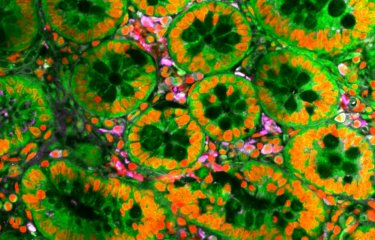The response to infection is highly variable from one individual to another. The Milieu Intérieur consortium, coordinated by Prof. Matthew Albert (Immunobiology of dendritic cells Unit, Institut Pasteur / Inserm) and Dr Lluis Quintana-Murci (Human Evolutionary Genetics Unit, Institut Pasteur / CNRS) seeks to establish the parameters that characterize the immune system of healthy individuals and its natural variability. In a study just published (August 25th) in Cell Reports, the researchers describe a new approach for analyzing the inflammatory response at the gene expression level in blood samples from healthy individuals, which reproduces the conditions of in vivo stimulation.
The striking result from this study is that the immune response to complex stimuli such as bacteria, viruses, and fungi could be defined and distinguished based on a small number of genes that were induced by 4 key immune proteins or cytokines. In particular as few as fourty-four genes, that were identified by machine learning techniques, could explain the variance present within such diverse immune responses.
In the era of high-throughput sequencing approaches which have huge challenges for data analysis and medical applications, this study suggests that simplified approaches if properly targetted may provide more effective solutions with easier clinical translation. In addition the study highlights that the utilization of highly standardized techniques for all steps including sample collection, sample preparation, and data analysis results in the generation of higher quality and more informative data.
In support of the published article, reference values are providied for each immune stimuli which reflects the natural variation of immune responses in humans. An online application was also released which provides an opportunity for the scientific community to exploit these data and to explore which genes are induced by a variety of immune stimuli.
This newly established approach is now being applied to the 1000 healthy donors within the Milieu Intérieur cohort, which will enable the dissection of how age, gender, environment, lifestyle, and genetics contribute to variable immune responses. This is a first necessary step on the path towards preceision medicien approaches.
En savoir plus
www.milieuinterieur.fr
www.synapse.org/milieuinterieur
Source
Standardized whole-blood transcriptional profiling enables the deconvolution of complex induced immune responses, Cell Report, 2016 August 25.
Alejandra Urrutia,1,2,10,11 Darragh Duffy,1,2,3,11 Vincent Rouilly,3 Céline Posseme,3 Raouf Djebali,3 Gabriel Illanes,3,4,5 Valentina Libri,3 Benoit Albaud,6 David Gentien,6 Barbara Piasecka,3 Milena Hasan,3 Magnus Fontes,4,7,11 Lluis Quintana-Murci,8,9,* Matthew L. Albert,1,2,3,10,12,* and Milieu Intérieur Consortium
1. Laboratory of Dendritic Cell Immunobiology, Department of Immunology, Institut Pasteur, Paris 75015, France
2. INSERM U1223, Paris 75015, France
3. Center for Translational Research, Institut Pasteur, Paris 75015, France
4. IGDA, Institut Pasteur, Paris 75015, France
5. Centro de Matematica, Facultad de Ciencias, Universidad de la Republica, 11200 Montevideo, Uruguay
6. Institut Curie, Centre de Recherche, Département de recherche translationnelle, Plateforme de Génomique, Paris 75005, France
7. Centre for Mathematical Sciences, Lund University, 221 00 Lund, Sweden
8. Laboratory of Human Evolutionary Genetics, Department of Genomes and Genetics, Institut Pasteur, Paris 75015, France
9. CNRS URA3012, Paris 75015, France
10. Department of Cancer Immunology, Genentech Inc., San Francisco, CA 94080, USA
11. Co-premier auteur
12. Contact principal
Mis à jour le 26/08/2016





